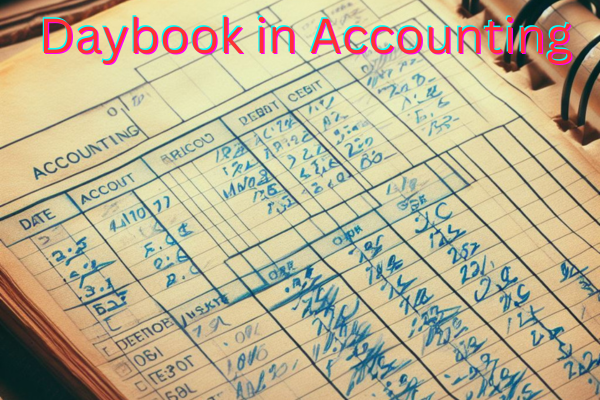Contents
Introduction of Daybook in Accounting
Daybook in Accounting, In the world of accounting, precision and cooperation are paramount. To preserve correct monetary records, accountants and corporations use a number of equipment and techniques. One such imperative device is the Daybook. This article delves into the meaning, importance, advantages, and key elements of a Daybook in accounting.
Whether you are a commercial enterprise owner, a pupil of finance, or sincerely fascinated by grasping the fundamentals of accounting, this complete information is designed to grant you a clear grasp of this fundamental accounting element.
What is a Daybook in Accounting?
A Daybook, in accounting, is a log or report of the place each day economic transactions are at the start recorded. These transactions can consist of sales, purchases, expenses, and different economic activities. It serves as the first factor of entry for all economic records earlier than it is labelled and transferred to the universal ledger. The Daybook is normally a chronological record, which means transactions are entered in the order they occur.
Importance of a Daybook in Accounting
A Daybook performs a pivotal position in the accounting process. Here are its key importance:
1. Data Accuracy:
One of the most necessary factors of accounting is making ensure the accuracy of monetary data. The Daybook serves as a major device for taking pictures of real-time economic transactions, lowering the hazard of mistakes and omissions.
2. Transaction Tracking:
A Daybook allows for handy monitoring of each day’s transactions. This chronological report makes it easy to hint at the glide of cash in and out of a business, which is quintessential for monetary evaluation and auditing.
3. Compliance:
For businesses, retaining a Daybook is regularly a felony requirement. In many jurisdictions, organizations are obligated to keep correct and up-to-date monetary records, which consists of the use of Daybooks.
4. Simplifies Record-keeping:
Daybooks streamline the record-keeping process. Instead of having to enter particular transactions into the time-honoured ledger, a Daybook gives a handy and environment-friendly way to document transactions as they occur.
5. Audit Trail:
In the tournament of an audit, a Daybook serves as a useful resource. Auditors can use it to confirm the accuracy and legitimacy of a company’s monetary transactions.
Advantages of Using a Daybook in Accounting
1. Organization:
Daybooks assist in the systematic organization of monetary data. Transactions are recorded in a logical order, making it simpler for accountants to retrieve records when needed.
2. Real-time Recording:
By recording transactions as they happen, Daybooks provide real-time insight into a company’s monetary activities. This is vital for making knowledgeable selections and retaining economic health.
3. Reduced Errors:
When monetary statistics are recorded at once in a Daybook, there is much less danger of blunders creeping in. This is specifically essential for retaining correct economic statements.
4. Saves Time:
Daybooks simplify statistics entry. Accountants can focal point on recording transactions as they occur, instead of having to allocate giant blocks of time for information entry into the widespread ledger.
5. Historical Reference:
Daybooks serve as a historical reference. They furnish a document of previous economic transactions that can be useful for fashion evaluation and long-term monetary planning.
Features of a Daybook in Accounting
1. Date and Time Stamp:
Each entry in a Daybook consists of the date and time of the transaction. This chronology is quintessential for correct record-keeping.
2. Transaction Description:
A short description of the transaction is included. This description must supply ample records to recognize the nature of the transaction.
3. Debit and Credit Columns:
Daybooks usually have columns for each debit and credit score entry, permitting the clear recording of inflows and outflows of money.
4. Running Totals:
Some Daybooks may additionally consist of jogging totals, displaying the cumulative economic role as transactions are recorded.
5. Categories and Accounts:
Transactions are frequently classified or assigned to precise accounts, making it less complicated to switch them to the standard ledger.
6. Source Documentation:
Supporting documents, such as invoices or receipts, are regularly connected or referenced in the Daybook, imparting proof of the transaction’s legitimacy.
Conclusion
In the realm of accounting, the Daybook stands as an indispensable device for keeping correct economic records. Its importance lies in its capacity to make certain statistics accurate, simplify record-keeping, and supply a real-time picture of a company’s monetary activities. The blessings of the usage of a Daybook are numerous, inclusive of organization, error reduction, and time savings. Meanwhile, its key features, like date and time stamps and transaction descriptions, are designed to decorate readability and accountability.
For groups and humans alike, appreciation of the significance and benefits of a Daybook is indispensable in preserving sound economic practices and making sure compliance with felony requirements. Whether it is a bodily ledger or a digital accounting system, the Daybook stays a cornerstone of monetary record-keeping in the cutting-edge world.

Leave a Reply